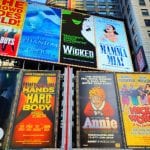 Animals
Animals  Animals
Animals  Facts
Facts Ten Unexpectedly Fascinating Facts About Rain
 Crime
Crime 10 Dark Details of Australia’s Gruesome Unsolved Wanda Murders
 Humans
Humans 10 Unsung Figures Behind Some of History’s Most Famous Journeys
 Animals
Animals 10 Species That Refused to Go Extinct
 Weird Stuff
Weird Stuff 10 Weird Things People Used to Do at New Year’s
 Our World
Our World 10 Archaeological Discoveries of 2025 That Refined History
 Weird Stuff
Weird Stuff 10 Fascinating Facts You Might Not Know About Snow
 Miscellaneous
Miscellaneous Top 10 Things Crypto Was Supposed to Change & What Actually Did
 History
History 10 Huge Historical Events That Happened on Christmas Eve
 Animals
Animals 10 Strange Times When Species Evolved Backward
 Facts
Facts Ten Unexpectedly Fascinating Facts About Rain
 Crime
Crime 10 Dark Details of Australia’s Gruesome Unsolved Wanda Murders
Who's Behind Listverse?

Jamie Frater
Head Editor
Jamie founded Listverse due to an insatiable desire to share fascinating, obscure, and bizarre facts. He has been a guest speaker on numerous national radio and television stations and is a five time published author.
More About Us Humans
Humans 10 Unsung Figures Behind Some of History’s Most Famous Journeys
 Animals
Animals 10 Species That Refused to Go Extinct
 Weird Stuff
Weird Stuff 10 Weird Things People Used to Do at New Year’s
 Our World
Our World 10 Archaeological Discoveries of 2025 That Refined History
 Weird Stuff
Weird Stuff 10 Fascinating Facts You Might Not Know About Snow
 Miscellaneous
Miscellaneous Top 10 Things Crypto Was Supposed to Change & What Actually Did
 History
History 10 Huge Historical Events That Happened on Christmas Eve
Top 10 Broadway Flops That Actually Aren’t That Bad
As much as the world loves a good piece of art, sometimes bad ones can be just as much fun. Sold-out midnight showings of The Room and the popular podcast My Dad Wrote a Porno (in which a man reads his father’s embarrassing erotic novel out loud to friends) show that we love bad media just as much.
But sometimes, media gets a bad rep before it’s truly been judged fairly. For Broadway, this can be particularly damning: One bad week and your show might get a closing notice. Here are some shows that were generally disliked on Broadway but have enough redeeming factors to remain interesting and relevant.
Related: 10 Weird Sci-Fi and Fantasy Musicals You Won’t Believe Existed
10 Catch Me if You Can
Based on the iconic Leonardo DiCaprio and Tom Hanks movie (which itself was based on the autobiography), Catch Me if You Can follows conman Frank Abagnale Jr. as he makes his way across the world pretending to be a pilot, a doctor, and a lawyer, all while cashing fake checks wherever he can.
The musical adaptation seemed to have everything going for it, with Scott Wittman and Marc Shaiman (writers of the musical version of Hairspray) as writers and Broadway favorites Aaron Tveit, Norbert Leo Butz, and Kerry Butler starring.
Unfortunately, no amount of check fraud could save Catch Me if You Can from closing after only 170 performances. Reviews were mixed to negative upon opening, with most reviewers pointing out that the show doesn’t seem to take itself very seriously, with both Frank the conman and FBI agent Carl Hanratty leaning into a superficial version of the very real story.
But not every piece of media needs to be serious, with a deep moral. The show has some Hairspray-esque sixties bops and tells the story it intends to. Maybe the characters aren’t very rounded, and maybe the plot deviates from the book, but considering it was recently discovered that the book was mostly fictional…
It never hurts to have a little fun. [1]
9 Seussical
It may surprise some to hear that Seussical was a huge financial flop on Broadway, considering how many high schools and middle schools mount the show these days, but it’s true. The show, which is a collection of Dr. Suess stories rolled into one musical plot, closed in less than six months and lost $10.5 million in investments.
To put it bluntly, the show is quite silly. The plot is all over the place, combining elements of Horton Hears a Who, The Cat in the Hat, Green Eggs and Ham, The Lorax, Hop on Pop, and pretty much any other Suess story you can think of.
The average age of a Broadway patron is between 40-45 years old. Who can blame a 40-year-old who paid upward of a hundred dollars for a ticket for being annoyed by the childish nature of Seussical?
That being said, although the show didn’t succeed on Broadway, it has had a healthy life in regional theater due to its popularity, with children both performing and watching it. Even for an adult, it’s fun to have the Cat in the Hat act as your emcee for the night, as you hear the stories you know and love acted out in musical form. But it makes it much more enjoyable to pay a few dollars and sit a few feet from the stage than to spend half a paycheck for the nosebleeds.[2]
8 Tuck Everlasting
Based on the Natalie Babbitt novel of the same name, Tuck Everlasting closed on Broadway after only 39 performances. Both the book and the musical focus on a young girl, Winnie, who befriends a family of immortals called the Tucks. Seventeen-year-old Jesse Tuck asks Winnie, who’s eleven, to become an immortal herself once she turns his age: Then they can be together forever.
Reading this as a child and experiencing this on a stage as an adult are two different things. Though Jesse is only 17, he’s been 17 for over a hundred years, making his proposition quite problematic. The book is a classic from almost 50 years ago, and it is easy to forgive the creepiness when it is only imaginary. But audiences didn’t enjoy watching a grown man propose to a little girl on stage: Even the 2002 movie aged Winnie up to make it a little less weird.
Of course, this wasn’t the only reason for Tuck Everlasting’s failure. Critics found the show lacked any real risk, and a 10-minute-long ballet seemed to come out of nowhere, according to many.
Ignoring the plot issues, though, and looking at it more holistically, it’s easy to see why the show’s creators saw merit in it in the first place. The songs are sweet and catchy, and the end (which I won’t spoil) takes a look at humanity and all it brings: Is life precious because you can only live for so long? Or should one take the opportunity to stretch it out as long as you can?
It doesn’t help that Tuck happened to open in the same season as a little musical called Hamilton.[3]
7 Groundhog Day
The 1993 Bill Murray movie Groundhog Day was an instant hit. To this day, the term Groundhog Day as a repetitive situation has become part of American culture. So it seems like a no-brainer that a musical based on the movie should do well commercially, right? Wrong.
The TV-themed set continually broke down during performances, and the star of the show ended up tearing his ACL on stage right before opening night. In addition to these misfortunes, although the show received generally positive reviews, sleeper hit Dear Evan Hansen ended up taking away the spotlight from this smaller show.
Groundhog Day closed after 176 performances, which is a real shame. Many musical adaptions of movies simply look to profit off the same of the popular film, simply reproducing the plot for the stage. Groundhog Day took a deeper look at the original material, a dark comedy, and really focused on the “dark” aspect. Suicide is a major theme (there’s an entire song about it!), and similarly to Tuck Everlasting, the musical asks some tough questions about humanity and life as we know it.[4]
6 Bonnie and Clyde
From Wonderland to The Civil War and Dracula, poor Frank Wildhorn can’t seem to catch a Broadway break. His 2009 musical Bonnie and Clyde is based on the infamous bank-robbing duo and was met with mixed reviews upon its opening night.
In a show about guns and sex, reviewers seemed to agree that not much happened. Although Jeremy Jordan (Clyde) and Laura Osnes (Bonnie) are both terrific actors, the book apparently fails to explore their relationship beyond “Let’s have sex!” (offstage, of course.)
Despite the problems with the plot, the score makes up for it. Much of it is based on authentic 1930s music that Bonnie and Clyde themselves might have hummed in the Texas heat: bluegrass, gospel, and country. The songs are both toe-tappingly catchy and touching. A personal standout is “Made in America,” a song in which impoverished Americans sing about why they idolize criminals: When your country has no love for you, you learn to root against the government-run banks.[5]
5 The Scottsboro Boys
As evidenced by musicals like Hamilton and 1776, it’s more than possible for a musical about American history to succeed both critically and financially.
Unfortunately, not everyone wants to remember all parts of the country’s history.
The Scottsboro Boys tells the real-life story of nine black boys in 1931 Alabama who are falsely accused of raping two white women. The historical case took the country by storm, igniting questions about the ethicality of all-white juries, lynch mobs, and the right to a fair trial.
The musical relays the story in a unique way: The accused boys sing, dance, and act like minstrels in order to satirize and criticize the racist form of entertainment. Of course, not everyone saw it that way. Some audiences saw the minstrelry as offensive and antiquated. People even boycotted and protested outside the theater, which unsurprisingly led to the show closing before making much money.
Besides just bringing light to an important scene in U.S. history that is often overlooked, The Scottsboro Boys used the racist background of minstrelry to showcase the ridiculous, bigoted media and legal circuses that the real Scottsboro boys were plagued by.[6]
4 Carrie
Much has been said about the musical version of Carrie, which is widely regarded as one of the worst musical flops of all time. There’s even an entire book about it!
When it debuted in 1988, the show was met with scathing reviews and closed after just five performances. The Off-Broadway revival in 2012 didn’t fare much better, ending two weeks before its scheduled final performance.
Generally, it’s the over-the-top campiness and odd humor of the musical version of the horror story that people have found off-putting. And sure, some of the lyrics are a little… well, terrible. But the special effects can make or break a production. After all, a show with supernatural effects that culminates with an ocean of blood being poured onto an actor can be pretty mystifying. Who cares about a few mediocre songs?[7]
3 The Rocky Horror Show
Not to be confused with The Rocky Horror Picture Show, the movie version which came out in 1975, The Rocky Horror Show was a failure on Broadway. But that didn’t stop it from being adapted into the worldwide cult classic that gets shown in theaters across the world to this very day.
Though the show had done well in the United Kingdom in the years before, American audiences were not impressed. Very few theaters these days attempt to produce the show, which makes sense considering the popularity of interactive movie nights with the film, where audience members can throw things at the screen, shout as much as they want, dance along, and generally be a menace.
The most successful live version of the show was staged in 2015 and simulcast to theaters across Europe. Even though the movie and musical are nearly identical, the popularity of the “picture show” version has definitely overshadowed the original format of this classic.[8]
2 Spiderman: Turn off the Dark!
Where to begin with the infamous disaster that was Spiderman: Turn off the Dark!? It’s been made fun of and parodied on Saturday Night Live, Conan, the New Yorker, and Mad.
From Bono’s (who wrote the music and lyrics) pretentious description of the show pre-opening night to the ambitious special effects, this show failed not for a lack of artistic vision but mainly for circumstances out of their control.
Ambitious technical effects such as Spiderman swinging from the stage excited audiences and reviewers but unfortunately led to many injuries. Because of various injuries and safety issues, the opening night was continually delayed. Once it opened, critics disliked the weak score and book, and ticket sales dropped rapidly.
Since then, the Spiderman musical has gone down in history as an experimental, but ultimately too dangerous, show to continue.[9]
1 Merrily We Roll Along
Today, it seems almost impossible to believe that a show written by the incomparable Stephen Sondheim could ever be a flop. But in 1981, Merrily We Roll Along closed on Broadway after only 15 performances.
With a story of friendship and careers in show business told in a reverse timeline, it’s easy to see how audiences were a bit confused. Add that to the fact that while absolutely gorgeous, Sondheim lyrics are known to be quite confusing and difficult to follow, and you have one of the most infamous flops in Broadway history.
Luckily, like many shows before it, Merrily has had a comeback. Including a Broadway revival opening in fall 2023 and a movie reportedly in the works, it’s become impossible to deny that this is one of Sondheim’s finest works. From the hopeful optimism of songs like “It’s a Hit” to devastating memorials to friendships lost, Merrily is a triumph of musical theater.[10]








